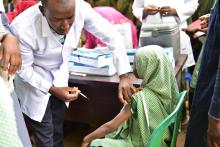Mitigating the risk of cervical cancer with HPV vaccine in Borno and Yobe States, Nigeria
Mitigating the risk of cervical cancer with HPV vaccine in Borno and Yobe States, Nigeria
With over 660 000 cases of cervical cancer reported globally and around 350 000 deaths recorded among women as of 2022 cervical cancer remains the second leading cause of cancer among women in Nigeria, and fourth globally indicating, at least 95% of cases are caused by Human papillomavirus (HPV) infection.
This startling statistic reflects major inequities driven by a lack of access to national HPV vaccination, intensified awareness, cervical screening, and treatment services.
To bridge the gap and ensure everyone especially women and girls have access to basic healthcare services, regardless of their socio-economic status The World Health Organization (WHO) with funding from Gavi, The Vaccine Alliance, has supported the Borno and Yobe State Governments to flag off HPV vaccination campaigns across the states.
The campaign, which is a state-wide intervention in Borno and Yobe states, is expected to cover at least 750 public and private schools, including reaching at-risk populations living in hard-to-reach and underserved locations.
Speaking at the flag-off, the Borno State Honourable Commissioner for Health and Human Services, Professor Mallam Gana, represented by the Special Adviser on Health, Dr Abubakar Hassan, said this is part of the overall state’s initiative to protect at-risk populations, especially women and children. We will strategically monitor the overall exercise thoroughly and ensure high quality of service is sustained.
Dr Hassan further lauded the efforts of the World Health Organization for its continual support, leadership as the global health lead and contribution to the overall planning of the HPV vaccination campaign.
“WHO’s leadership and technical support in ensuring access to healthcare services, especially this vaccination, is quite commendable. We are optimistic that this campaign will be a success, and that the collaboration with the World Health Organization (WHO) will be sustained thereby strengthening the health system.”
Meanwhile, in the counterpart state, Yobe, the wife of the Executive Governor, represented by the State’s Commissioner for Women’s Affairs, Hajia Ya-Jalo Badama said that the HPV vaccine is free, safe, and effective, and we will ensure at-risk populations are provided with the opportunity to protect themselves against cervical cancer.
“All hands and resources are on deck to ensure the success of this campaign and we would like to appreciate the relentless support received from the World Health Organization (WHO), especially in providing guidance, ensuring effective coordination and orientation for the healthcare workers,” added Hajia Ya-Jalo.
The vaccination campaign against Human papillomavirus (HPV) across Borno and Yobe states is targeting children 9 – 14 years (more than 447 000 in Borno and at least 350 000 in Yobe states), and it is expected to prevent them from HPV infection, cervical cancer and other HPV-related cancers.
Furthermore, the WHONigeria Country Representative, Dr Walter Kazadi Mulombo says, this support is in line with the implementation of the fourth WHO-Nigeria Country Cooperation Strategy (CCSIV) which includes ensuring more people enjoy better health and well-being and benefit from universal health coverage.
This strategy falls within the Government's vision for the Sector Wide Approach (SWAp) to achieve health for all Nigerians.
Reiterating the World Health Organization’s steadfastness in supporting the states in eliminating this life-threatening disease and ensuring the success of the vaccination campaign, the WHO State Coordinators for Borno and Yobe, Drs Ibrahim Salisu and Alhassan Dama said, “Cervical cancer is preventable, and this vaccination campaign is aimed to protect at-risk populations against HPV, and WHO is ensuring the success of this exercise as it is one of the must win supports in the states.”
The State’s Coordinators added that, to ensure a better and healthier future, WHO will continue to support the states to champion a more comprehensive approach to eliminating the disease.




